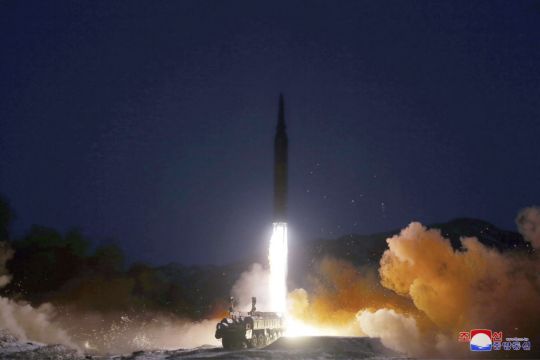North Korea says leader Kim Jong Un oversaw a successful flight test of a hypersonic missile he claimed would remarkably increase the country’s nuclear “war deterrent”.
The report by North Korean state media on Wednesday came a day after the militaries of the United States, South Korea and Japan said they detected North Korea firing a suspected ballistic missile into its eastern sea.
The Korean Central News Agency (KCNA) said Tuesday’s launch involved a hypersonic glide vehicle, which after its release from the rocket booster demonstrated “glide jump flight” and “corkscrew manoeuvring” before hitting a sea target 621 miles away.
Photos released by the agency showed a missile mounted with a pointed cone-shaped payload soaring into the sky while leaving a trail of orange flames and Mr Kim watching from a small cabin with top officials.

The launch was North Korea’s second test of its purported hypersonic missile in a week as Mr Kim continues a defiant push to expand his nuclear weapons capabilities in the face of international sanctions, pandemic-related difficulties and deadlocked diplomacy with the United States.
The North has been ramping up its testing activity in what experts see as an attempt to apply more pressure on rivals Washington and Seoul to accept it as a nuclear power in hopes of winning relief from economic sanctions.
The KCNA said Mr Kim praised the accomplishments made by his military scientists and officials involved in developing the hypersonic missile system, which he described as the most significant part of a new five-year plan announced in early 2021 to build up the North’s military force.
The North has described the new missile as part of its “strategic” weaponry, implying that the system is being developed to deliver nuclear weapons.
Hypersonic weapons, which fly at speeds in excess of Mach 5, or five times the speed of sound, could pose a crucial challenge to missile defence systems because of their speed and manoeuvrability.
Such weapons were on a wish-list of sophisticated military assets Mr Kim unveiled early last year along with multi-warhead missiles, spy satellites, solid-fuel long-range missiles and submarine-launched nuclear missiles.
Experts say North Korea is likely years away from acquiring a credible hypersonic system. But Mr Kim’s attendance at Tuesday’s launch and the state media’s description of it as a “final test-fire” indicated that the North was possibly moving toward deploying the weapon relatively soon.
“The superior manoeuvrability of the hypersonic glide vehicle was more strikingly verified through the final test-fire,” KCNA said.

It said Mr Kim stressed the need to speed up the expansion of the country’s “strategic military muscle both in quality and quantity and further modernise the army” and encouraged military scientists to continue their success in “remarkably increasing the war deterrent of the country”.
US State Department spokesman Ned Price said Washington condemns the North’s latest launch, which violates multiple UN Security Council resolutions and poses a threat to neighbours and to the broader international community.
The US Indo-Pacific Command said the launch highlighted the “destabilising impact of (North Korea’s) illicit weapons program” but did not pose an immediate threat to US territory or its allies.
South Korea’s Joint Chiefs of Staff had said the North Korean missile flew 434 miles at a maximum speed of around Mach 10 before landing in waters off the North’s eastern coast.
South Korea’s Defence Ministry had played down North Korea’s earlier test on January 5, insisting that the North exaggerated its capabilities after testing a conventional ballistic missile and expressing doubt that the North had acquired the technologies needed for hypersonic weapons.
Following Tuesday’s launch, the Joint Chiefs of Staff said in a statement that the North demonstrated more advanced capability compared to its previous test, but did not elaborate further.
Mr Kim entered the new year renewing his vow to bolster his military forces, even as the nation grapples with pandemic-related difficulties that have further strained its economy, crippled by US-led sanctions over its nuclear program.







